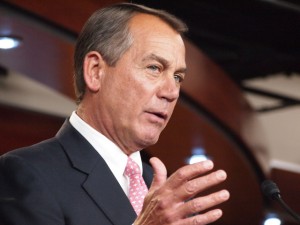
Over the past few months President Obama has twice risen as the decisive barrier between TransCanada and a permit for its Keystone XL pipeline. But an unanswered legal question hangs: why is the president, tasked with overseeing foreign affairs, given authority over congress, which is empowered to regulate commerce?
On November 11, 2011 President Obama and the State Department effectively postponed construction on the Keystone XL by committing to review its proposed route and suspect environmental impact statement. If constructed, the Keystone XL would span 1,700 miles from the tar sands of Alberta, Canada to the refineries of Port Arthur, Texas.
In high dudgeon, the Republican Congress led by Majority Leader Boehner saddled an unrelated tax relief bill with a provision calling for Mr. Obama to reconsider his decision on the pipeline, this time within sixty days.
Once again, the President rejected the Keystone XL: “As the State Department made clear last month,” said Mr. Obama, “the rushed and arbitrary deadline insisted on by Congressional Republicans prevented a full assessment of the pipeline’s impact, especially the health and safety of the American people, as well as our environment.”
Dissatisfied yet, Boehner is at it again, this time threatening to hitch the pipeline to a bill focused on the repair of U.S. infrastructure.

This deadlocked and farcical volley is the product of Executive Order 11423 – signed into force in 1968, updated in Executive Order 13337 – which deputizes the State Department to issue permits for “construction, connection, operation, or maintenance, at the borders of the United States” for projects that would “serve the national interest.”
It is unclear what is meant by “national interest.”
It is also unclear whether the authority of the State Department is absolute and final.
A recent analysis by the Congressional Research Service (CRS) explores the origin of this authority over transnational pipelines. (If no national borders are crossed, then state governments are empowered to permit pipelines.) Executive Order 13337 states that, “the proper conduct of foreign relations of the United States requires executive permission be obtained for the construction and maintenance” of border crossing facilities. The CRS finds no explicit constitutional support for this statement, but rather historical precedent through judicial ruling.
At loggerheads with this precedent is a core congressional power enumerated in Article I of the Constitution and commonly referred to as the commerce clause: “To regulate Commerce with foreign Nations, and among the several States, and with the Indian Tribes.”
Somewhat surprisingly, the CRS report concludes that presidential authority has so far derived only from the absence of congressional action, raising the question of which government branch gets final say if congress directly intervenes in the permitting process. Case history leaves room for the possibility that congress may legislate in the area if so inclined.
“Congress may consider legislation to overturn the domestic effect of legal action denying a permit for a border crossing facility for the Keystone XL pipeline,” says the CRS report. “It could also potentially establish criteria for the issuance of any cross border permits, and potentially require the issuance of permits to entities which fulfill such criteria.”
As this high-profile environmental issue jerks forward – more accurately, side-to-side across the aisle – a challenging and complicated legal battle may be pressurizing below the surface.